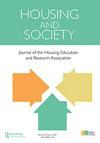坐在候诊室里:无家可归的人是否没有充分利用医疗服务?
Q2 Social Sciences
引用次数: 2
摘要
与一般人群相比,无家可归者的健康状况往往较差,因此对医疗服务的需求更大。然而,由于资源限制阻碍了获得保健服务,以及无家可归者生活的混乱性质,这一处境最不利的群体在获得保健服务方面可能面临更大的困难。我们使用澳大利亚小组调查“回家的旅程”,将无家可归者使用的医疗服务与同样脆弱但有正式住房的群体使用的医疗服务进行对比,我们还可以控制与健康相关的需求。本文测量了过渡性和持久性无家可归与卫生服务使用的关系程度,控制了卫生需求的差异;并调查是否有任何差异证实了先前的研究结果,这些研究结果表明,无家可归者大量使用支助服务(例如住院),但很少使用初级保健服务(例如全科医生和牙医),而初级保健服务是获得专业服务的重要途径。本文章由计算机程序翻译,如有差异,请以英文原文为准。
Sitting in the waiting room: do people experiencing homelessness underutilize health services?
ABSTRACT Homeless persons tend to have poorer health than the broader population, and thus have a greater need for health services. However, due to resource constraints impeding access to health care, and the chaotic nature of living as a homeless person, this most disadvantaged group may face greater difficulties accessing health services. We use an Australian panel survey, Journeys Home, to contrast health service use by people experiencing homelessness with service use by a similarly vulnerable, yet formally housed group where we can also control for health-related needs. The paper measures the extent to which transitional and enduring homelessness is related to health service usage controlling for differences in health needs; and investigates whether any differences confirm prior research findings which suggest that individuals suffering homelessness are heavy users of support services (e.g., hospital admissions) but light users of primary health services (e.g., general practitioners (GPs) and dentists) that are an important gateway to specialist services.
求助全文
通过发布文献求助,成功后即可免费获取论文全文。
去求助
来源期刊

Housing and Society
Social Sciences-Urban Studies
CiteScore
2.30
自引率
0.00%
发文量
10
期刊介绍:
Housing and Society is the journal of the Housing Education and Research Association (HERA). The journal supports the mission of HERA by providing for the dissemination of research and other scholarly work. Submissions from a broad range of perspectives are encouraged. Topics in housing include: policy, design, social aspects, gerontology, behavioral aspects, energy/environment, equipment, interiors, economics, theory/model development, education, and program development or evaluation. The journal welcomes the submission of original research articles, notes and commentaries. Notes are shorter manuscripts presenting succinct information on housing related to one of the following categories: - Research: exploratory or not heavily theory-based or statistically analyzed - Academic: innovative teaching ideas - Program: development, implementation, and/or evaluation of Cooperative Extension or other housing programming efforts - Policy: examination of policy impact, comparative analysis, and/or need to achieve housing goals - Reviews: books, documentaries, etc.
 求助内容:
求助内容: 应助结果提醒方式:
应助结果提醒方式:


